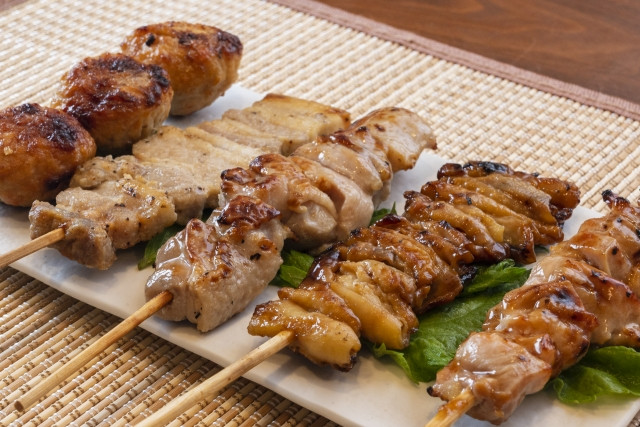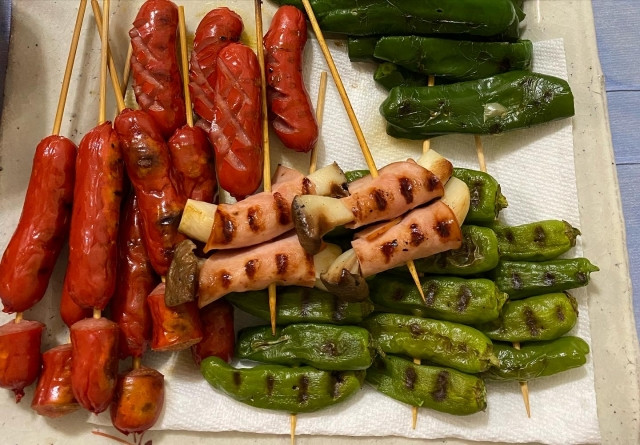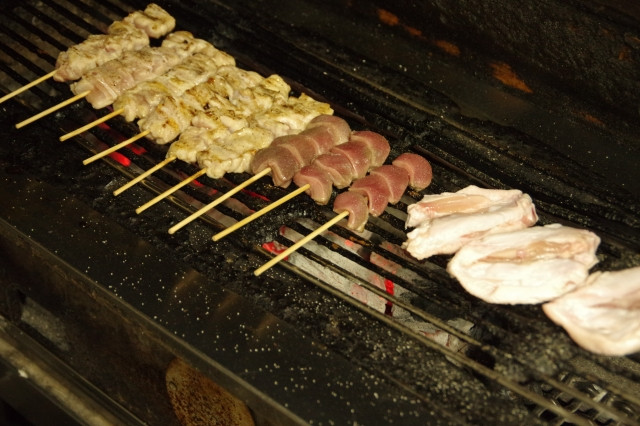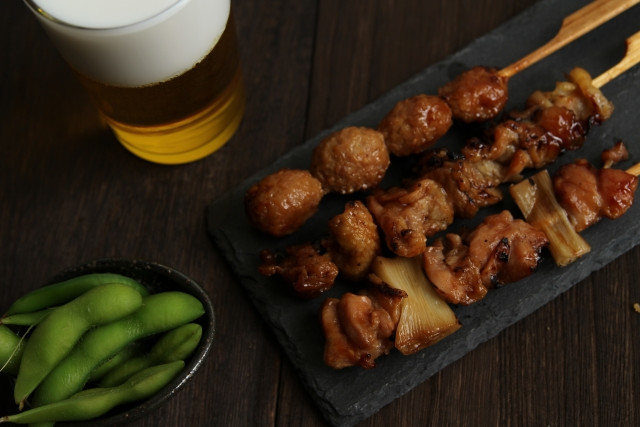Yakitori, meaning grilled chicken, is a classic Japanese dish, snack or even meal. Best enjoyed with beer, it can be found anywhere from supermarket cooked food sections, izakaya, matsuri food stalls, bento shops, and restaurants. Healthy and delicious, sweet and salty, and cheap! Yakitori is the best!
Table of Contents
All About Yakitori
Yakitori are skewered bite-sized chicken grilled over a fire. They are usually available in two flavours, salted (塩 Shio) or sauced (たれ Tare).
Similar Foods to Yakitori

Shish Kebabs from Middle East cuisine are quite similar to yakitori being also skewered meat pieces that are grilled. Lamb is most used but other types of meat like beef and chicken as well as vegetables are also available. Metal skewers are sometimes used for shish kebabs whilst yakitori typically only uses wooden sticks.

Satay from Indonesian cuisine is another similar food. They are also available in other nearby countries like Malaysia, Singapore, and Thailand. Meat options are usually chicken or beef, though other options like mutton, goat, pork (Chinese establishments), and exotic ingredients (rabbit, ostrich, buffalo, crocodile, etc.) are available. The meat is pre-marinated in a sweet sauce before being barbecued over a charcoal flame. It is typically served with a spicy peanut sauce though there are other sauces available as well.
Yakitori Origins
Yakitori dates back to the Meiji era when the Japanese people developed a taste for meat. Prior to that period, the Japanese mostly practised vegetarianism due to their Buddhism beliefs who believed in the sanctity of all life. (For more about Buddhism, we recommend this article: Buddhism: Studying the Pathway of
Enlightenment in Japanese Society)
Yakitori was the perfect, and also inexpensive, dish to introduce meat to the public whose diets were plant-based. The tare (sauce) and sweetness plus the smokiness from over-the-fire grilling went a long way to cover up the odour of meat. At that time, aside from chicken, other types of meat and innards were also used.
Yakitori gradually transformed into one of the most popular Japanese food choices. Always available in Izakayas, there are even specialty stores and restaurants that are dedicated to Yakitori.
※ Michelin Guide, “Yakitori”
Writer's Pick
Yakitori Varieties
With the knowledge of Yakitori’s history, you’ll better appreciate this simple yet delicious dish. So, time to get into the most important part of this article, knowing what yakitori to eat:
Popular Yakitori Types
Yakitori can be separated into many different types, usually by parts of the chicken. Most places will ask whether you want shio (salted) or tare (sauced) when you place your order. We recommend trying both to compare. Note that, though rare, some places don’t offer a choice.
Here are some of the most popular yakitori:
Negima
A mix of chicken meat and negi or Japanese long onion. Chicken thigh is usually used and alternates with a piece of negi.
Momo
Momo is chicken thigh. One of the best parts of the chicken, it is super juicy and tender. Fun Fact: Momo is the part used to make karaage.
Torikawa
Torikawa is chicken skin. Grilled until the skin is golden brown and crispy. It contains some of the flavourful underskin fats. It is really delicious but not for everyone due to the oiliness.

Tsukune
Tsukune are chicken balls. Classic ingredients are minced chicken, onions, spices for flavouring, egg, breadcrumbs. It has a nice chewy texture, and is usually sauced with tare.
Sasami
Sasami is chicken tenders. It is a healthy, less fattening part of the chicken. It is usually lightly grilled to prevent overcooking. A good choice for the health-conscious.
Kimo / Reba
Kimo is chicken liver. It is also known as reba レバー which is the katakana form of liver. It has a strong taste and a creamy texture.
Sunagimo
Sunagimo is chicken gizzard (chicken stomach). It has a super chewy texture and mild to strong flavour.
Tebasaki
Tebasaki are chicken wings. Some places don’t have them skewered and deep fry instead of grilling them.
Not Just Chicken Skewers

Yakitori restaurants also serve other types of chicken dishes and meat skewers. Some popular ones include:
Gyu Kushiyaki
Beef skewers. Depending on the place they may offer gyutan (beef tongue) as well.
Mochi Cheese
A personal favourite is mochi cheese. The sweetness and saltiness come together to create a heavenly taste. Not to mention chewy and stretchy.
Karaage
Classic Japanese fried chicken. Also not skewered.
Torikawa Chips
Chicken skin but instead of yakitori grilled style, these are deep fried until super crispy. Compared to yakitori style where you can still feel the fatty soft texture, these chips are fried till purely crisp.
Vegetables
Vegetable skewers to make your meal healthier. Common ones are mushrooms, onions, and peppers. Meat stuffed green pepper skewers are tasty; the bitterness of the pepper blends well with sweet salty tare and the smoky taste and smell.
Alcoholic Drinks
Yakitori places are a popular and affordable nomikai spot. They are also almost always available to order at izakayas. Yakitori goes really well with not just beer but also sake and other Japanese alcoholic beverages.
Where to Eat Yakitori

As mentioned before, you can get yakitori everywhere from supermarkets, convenience stores, bento shops, izakayas, summer festival food stalls, etc. The best places for yakitori are specialty stores and chicken butcher shops (お肉屋 o-niku-ya) that sell yakitori.
Here are some recommended yakitori specialty stores to try:
Ginza Torishige
Operating since 1931, Ginza Torishige is an upper-class restaurant specialising in Yakitori. Expect their prices to be well above averages. In return, you’ll get excellent food and wonderful service.
Torikizoku
Torikizoku is a popular, inexpensive yakitori restaurant chain with branches all over Japan. They are frequented by students, young people, and salarymen thanks to their affordable pricing and wide availability.
Toriyoshi
Toriyoshi is a mid-range priced Japanese restaurant. They actually specialise in tebasaki but the yakitori are also to die for. They also serve other chicken dishes like soba, sushi, and more for a washoku 和食 experience.
How much does Yakitori cost?
The average cost of Yakitori is 108 yen per stick according to JP Market Conditions. The estimated cost of a one person meal at Torikizoku would be 3,000 to 5,000 yen.
※ 小売物価統計調査による価格推移 (JP Market Conditions), “全国の焼き鳥1本価格推移 / 過去83ヵ月”
Takeaway

Considering the simplicity that is yakitori, it probably never occurred to you how interesting its origins are. Now that you do, you can enjoy and appreciate this delightful dish even more. For those that have yet to try, do take this opportunity to give it a go.
































